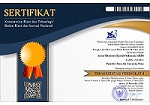Platform Layanan Ekonomi Berbagi: Studi Kualitas Layanan dan Kepercayaan terhadap Keberlanjutan Penggunaan dengan Religiusitas sebagai Moderasi
Abstract
Keywords
Full Text:
PDFReferences
Abbas, H. A., & Hamdy, H. I. (2015). Determinants of continuance intention factor in Kuwait communication market: Case study of Zain-Kuwait. Computers in Human Behavior, 49, 648–657. https://doi.
org/10.1016/j.chb.2015.03.035
Arteaga-Sánchez, R., Belda-Ruiz, M., Ros-Galvez, A., & Rosa-Garcia, A. (2020). Why continue sharing: Determinants of behavior in ridesharing services. International Journal of Market Research
, 62(6), 725–742. https://doi.org/10.1177/1470785318805300122
Syafira Amanda, Nurma Sari Astarina, I. G. A., Ayu, I. G., Giantari,
K., Nyoman, N., & Yasa, K. (2017). Peran Kepercayaan Memediasi
Pengaruh Pengalaman Terhadap Niat Menggunakan Kembali Jasa Gojek Di
Kota Denpasar. E-Jurnal Manajemen Universitas Udayana, 6 (5),2308–2334.
Boar, A., Bastida, R., & Marimon, F. (2020). A systematic literature review. Relationships between the sharing economy, sustainability and sustainable development goals. Sustainability (Switzerland), 12 (17). https://doi. org/10.3390/SU12176744
Chang, W. L., & Wang, J. Y. (2018). Mine is yours? Using sentiment analysis to explore the degree of risk in the sharing economy. Electronic Commerce Research and Applications, 28, 141–158. https://doi.org/10.1016/j.elerap.2018.01.014
Cheng, Y. M. (2021). Why do customers intend to continue using internet-based sharing economy service platforms? Roles of network externality and service quality. Journal of Asia Business Studies, 15(1), 128–
https://doi.org/10.1108/JABS-05-2019-0142
Dabbous, A., & Tarhini, A. (2019). Assessing the impact of knowledge and perceived economic benefits on sustainable consumption through the sharing economy: A sociotechnical approach. Technological Forecasting and Social Change, 149(October), 119775. https://doi.org/10.1016/j.techfore.2019.119775
Davis, J. (2018). The Real Story Behind Uber’s Exit from Southeast Asia
. https://knowledge. insead.edu/entrepreneurship/the-real-story-behind-ubers-exit-from-southeast-asia-10096
Ganapati, S., & Reddick, C. G. (2018). Prospects and challenges of sharing economy for the public sector. Government Information Quarterly, 35(1), 77–87. https://doi.org/10.1016/j.giq.2018.01.001
Hamdani, L. A. (2019). Gojek rebranding, dan kalahkan Grab soal engguna aktif bulanan. https://www.tek.id/tek/gojek-rebranding-dan-kalahkan-grab-soal-pengguna-aktif-bulanan-b1Xj29eZz
Kumar, V., Lahiri, A., & Dogan, O. B. (2018). A strategic framework for a profitable business model in the sharing economy. Industrial Marketing Management, 69(August), 147–160. https://doi.org/10.1016j.indmarman.2017.08.021
Shao, Z., & Ge, C. (2018). Impact of service quality on individuals’ ontinuance intention of the bicycle-sharing application. Proceedings of the 22nd Pacific Asia Conference on Information Systems - Opportunities and Challenges for the Digitized Society: Are We Ready?, PACIS
.
Shao, Z., Li, X., Guo, Y., & Zhang, L. (2020). Influence of service quality in sharing economy: Understanding customers’ continuance intention of bicycle sharing. Electronic Commerce Research and Applications, 40, 100944. https://doi.org/10.1016/j.elerap.2020.100944
Tsou, H. T., Chen, J. S., Chou, C. Y., & Chen, T. W. (2019). Sharing conomy service experience and its effects on behavioral intention. Sustainability (Switzerland), 11(18), 1–25. https://doi.org/10.3390/su11185050
Wanda, P. (2018). Belajar dari “Runtuhnya” Uber di Asia Tenggara https://news.detik.com/kolom/d-3954778/belajar-dari-runtuhnya-uber-di-asia-tenggara
Wang, Y., Asaad, Y., & Filieri, R. (2020). What Makes Hosts Trust Airbnb? Antecedents of Hosts’ Trust toward Airbnb and Its Impact on Continuance Intention. Journal of Travel Research, 59(4), 686–703. https://doi.org/10.1177/0047287519855135
Weng, J., Hsieh, Y. C., Adnan, M. Z., & Yi, L. H. (2020). The motivation for Muslim customers’ participation in the sharing economy. Resources, Conservation and Recycling, 155 (October 2019), 104554. https://doi.org/10.1016/j.resconrec.2019.104554
Wu, I. L. (2013). The antecedents of customer satisfaction and its link to complaint intentions in online shopping: An integration of justice, technology, and trust. International Journal of Information Management,
(1), 166–176. https://doi.org/10.1016/j.ijinfomgt.2012.09.001
Sani, A. A. (2020). Finacial Inclusion Profile In East Java. Al-Amwal: Jurnal Ekonomi dan Perbankan Syari'ah, 12(1), 60-76.
Mufti, R., & Suripto, T. (2020). Analisa Minat Mahasiswa Terhadap Penggunaan Layanan Internet Banking Bank BNI Syariah. JESI (Jurnal Ekonomi Syariah Indonesia), 10(1), 55-61.
Salam, A., & Irsyad, S. M. (2020). Peranan Otoritas Jasa Keuangan (OJK) Sebagai Lembaga Muhtasib Dalam Industri Keuangan Syariah di Indonesia. JESI (Jurnal Ekonomi Syariah Indonesia), 9(2), 73-85.
Wicaksana, R. S., Heksaputra, D., Bahrudin, M. J. U. H., Rahmanto, D. N. A., Irsyad, S. M., & Sani, A. A. (2020). Peningkatan Kesadaran Masyarakat Mengenai Potensi Desa Wisata Halal Melalui Program Sosialisasi dan Pemanfaatan Aplikasi ADIBA MSME. KUAT: Keuangan Umum dan Akuntansi Terapan, 2(2), 105-113.
Platform Layanan Ekonomi Berbagi: Studi Kualitas Layanan dan Kepercayaan terhadap Keberlanjutan .... 123
Zhu, G., So, K. K. F., & Hudson, S. (2017). Inside the sharing economy.
International Journal of Contemporary Hospitality Management, 29 (9), 2218–2239. https://doi.org/10.1108/ijchm-09-2016-0496
DOI: http://dx.doi.org/10.21927/jesi.2021.11(2).115-123

This work is licensed under a Creative Commons Attribution-ShareAlike 4.0 International License.












